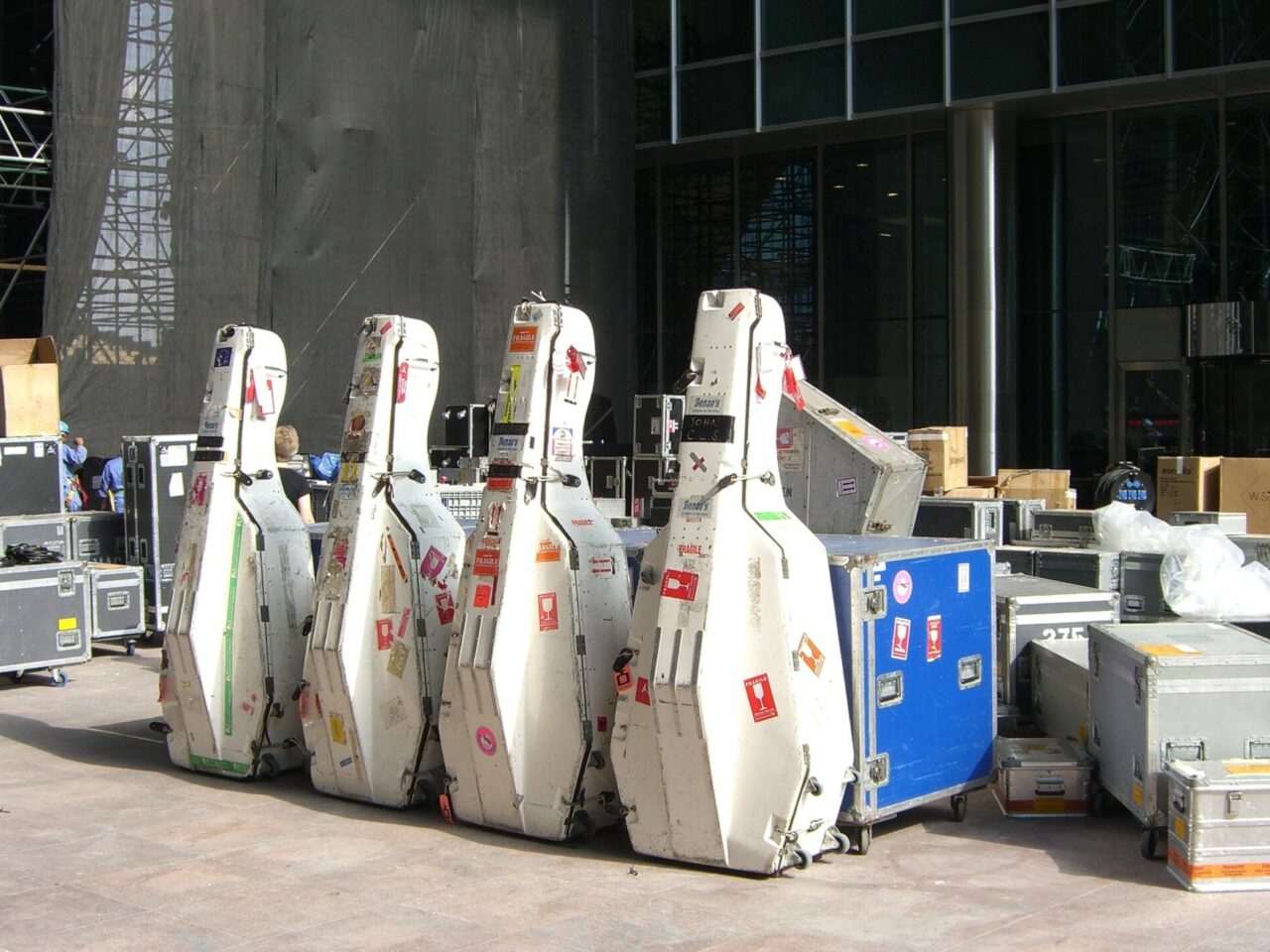CLS MEMORIES: TOURING

Elaine Baines has been with the orchestra since 1995. Here she reminisces about touring the world with CLS.
Touring is an essential part of any orchestra’s life and over the years CLS has been fortunate to be invited to play in Australia, China, Chile, Columbia, Mexico, UAE, and Japan as well as most countries in Europe.
Touring always seems to be the most glamorous of an orchestra’s activities – who would not want to be paid to tour the world and perform in some of the best and most interesting places on earth? The reality of touring for an orchestra manager is that you rarely get to see more than the airport, hotel, and concert venue and your only glimpse of the city is the route to and from the airport. I have been to Hamburg six times and I still have no idea what the city is like!
A tour where you remain in one city for more than one day is very unusual, either its travelling and concerts every day for anything up to two weeks or it is what is known as a hit and run concert – fly in the morning, rehearse in the afternoon, concert in the evening and back the next morning. Two or more nights in one hotel is a luxury I have only experienced in Cartagena, Columbia where CLS was very fortunate to be the orchestra in residence for a two week festival !
On a typical single concert trip, the tour manager’s day can start with arriving at the airport at 6am to try and organise a separate check in desk for the orchestra, handing out tickets and per diems and hoping the last person to arrive is not so late that its necessary to run to get to the gate in time.
Checking in can be fraught with difficulty and there is always the worry that a flight has been overbooked. A trip to Norway in the late 1990s involved an internal flight to Kristiansand, in the arctic circle. The flight had been seriously overbooked and I had to tell the check in desk very firmly that if the WHOLE orchestra did not make it to Kristiansand that morning we would have to cancel our concert for the King of Norway that evening. Several disgruntled businessmen were ejected from the flight but we were still a seat short. A seat was found for Mark Paine (principal horn for the trip) in the cockpit behind the pilot. The landing in Kristiansand was very bumpy and some wit called out ‘OMG they’ve let Mark land the plane!’
Getting cellos and basses onto flights can be ‘interesting’. We usually buy seats for the cellos and in the old days the ticket used to be in the name of Mr Jones Cello. I’ve had several conversations with confused check in staff who really wanted to see Mr Cello’s passport. Basses usually travel in enormous flight cases and are wheeled away to go through outsize luggage. It is wise to check that the plane is big enough to take two bass cases as I once had to hire a car and drive between Switzerland and Italy with a bass when we suddenly discovered they had changed the plane to a smaller model. Security staff do not always understand how valuable instruments can be. In Cartagena airport I had to persuade the gun toting military security guards that it wasn’t possible to remove the front of a double bass to check if it contained explosives. Once on the plane the first thing I always do is check with the stewards that the basses have actually been loaded. On a trip to Chile in the 1990’s Liz Fernee, the orchestra manager, noticed the basses being wheeled away from the plane across the tarmac. She immediately instructed the entire orchestra to stand up and refused to let them sit down until she had proof that the basses were on board!

You arrive at the destination airport, get everyone off the flight, hope all the luggage has turned up and the basses are still in one piece, stop players wandering off to get coffee so you can get them onto the coach and then it is off to the hotel. With a bit of luck all the rooms are ready so that everyone can check in, if not you try and arrange a lockable room for bags and instruments so people can go and eat. I’ve often given up my room to a player who needed to rest and taken my bag off to the concert hall to set up for the rehearsal. I’ve become quite adept over the years of bathing from a hand basin, drying with paper towels and changing behind a bass case.
If you are really lucky the concert hall has paid attention to your technical schedule and all the chairs, music stands and other equipment are there for you. I remember a tour of Germany, which I managed alone, where the music stands were still in store, the grand piano was in the wings and there were no stage staff to help set up. Moving a grand piano isn’t a problem – stopping it is! I had to do some nifty foot work during the concert to get the piano going and then head to the pointy end to stop it before it hit the cello section. German audiences are very polite though – I had a round of applause at every venue we played that tour!
If you are lucky the concert hall is awash with helpful and lovely staff willing to make your visit a pleasurable experience. In the Megaron Hall in Athens it turned into a power struggle about who was going to position music stands on stage and in Japan we had a tour manager who not only set up every concert stage on the tour but used a tape measure to ensure the stands were EXACTLY where the players needed them.
Sometimes the concert hall isn’t what you expect and life becomes very challenging. We performed in the amphitheatre at Ephesus and Glyn Matthews and I had to carry several large and extremely heavy flight cases of percussion across the ruins to get to the ‘stage’. I was very grateful later for the flight cases as I perched on them to avoid the large rats which came out to play when it got dark!
In the Teatro Degollado in Guadalajara, Mexico the temperature reached 40c and the old fashioned air conditioning in the theatre was so loud it had to be turned off during the concert. The orchestra started to visibly wilt and one of the basses only just managed to put down her instrument before she staggered off stage and fainted.
For those players who have lost luggage, forgotten their black socks, or worse black concert shoes, a clever manager has a small kit of essentials such as black gaffer tape which can transform any footwear into concert shoes, can be wrapped around ankles to look like socks and can even hold together a broken dress or fly zip. I have even used it to doctor my own black shirt or cardigan to make a dinner jacket or tails for a forgetful player.
The strangest dress malfunction I have had to deal with was on a trip to Dubai when the promoter decided that the orchestra should wear a traditional shirt and ladies of the orchestra were asked to bring black underwear to go under the black shirts which would be provided on the day of the concert. When we got to the venue the traditional shirt turned out to be a highly decorated and very sheer cream colour! The production manager and I had to set out to find 12 pale coloured bras of varying sizes in the centre of the finance district of Dubai!

The concert is over, you have packed up the music and the players have disappeared into the night to seek supper, local beer or their beds. You head back to the hotel, try and get a room list from the desk and hope everyone wakes up in time for the coach leaving.
Ensuring everyone is on the coach before you leave is an exercise in advanced logistics by itself. Do you tick off names as people appear or just do a head count ? If someone is missing its back to the reception desk to put in a call to what you hope is the correct room, check the dining rooms for tardy eaters or in extremis borrow a master key to drag someone out of bed. I can get someone dressed, pack their bag and have them on the coach with a snack stollen from the breakfast buffet in less than 10 mins ! I think I have only once left someone behind at the hotel. On a trip to Montreux two members of the choir decided to use the facilities after the head count had been done. I got a plaintive phone call 20 mins into the journey complaining they had been left behind. I’m not sure how much their taxi to the airport cost but I’m reasonably sure they won’t do that again !
For a tour manager the success or failure of a tour can often be measured by what did or didn’t go wrong but there is a strange camaraderie that forms amongst an orchestra on even the briefest of tours. That combined feeling of triumph and relief that we have all survived the rigours of leaving our shores, performed our best in a strange concert hall and lived to sample the delights of the duty free shop is what makes travelling worthwhile!



